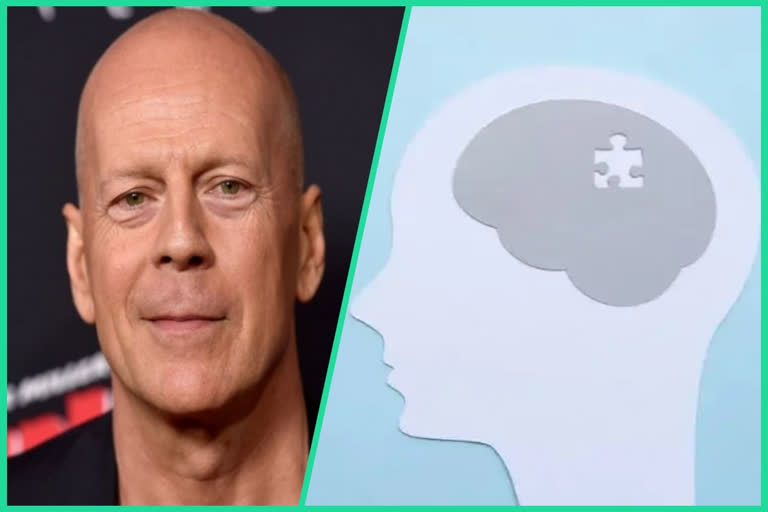Hyderabad: Dementia is mostly considered to be a disease of forgetfulness, as most of its types affect the patient's memory. Generally, ageing is considered the most common cause of dementia, but apart from it, various physical diseases, mental disorders or conditions can also be responsible for it. Dementia can affect younger people too, and it is of more than one type with different symptoms and effects.
After Hollywood Star Bruce Willis was diagnosed with the condition 'Frontotemporal Dementia", there has been curiosity among the general public regarding the disease. Frontotemporal Dementia or FTD is considered one of the most common types of dementia. It is a complex and incurable disease which is related to damage in certain areas of the brain. The seriousness of this disease can be gauged from the fact that under the influence of this disease gradually the victim may not just have to face issues with speaking, thinking, understanding and following normal routines and instructions, but they may also become completely dependent on others.
According to the Association for Frontotemporal Degeneration (AFTD), frontotemporal dementia is a major type of dementia, which is usually not detected on time. In the early stages of this disease, common symptoms of the condition are usually not seen, especially forgetfulness or memory loss.
In the initial stages of this disease, symptoms related to behaviour changes, speech or language are seen in the patients. But in most cases, these symptoms look so common that most people do not associate them with major neurological problems. In such cases, by the time FTD gets detected in a patient, a lot of damage has already been done by the disease. Experts agree that patient care in frontotemporal dementia can be more challenging, difficult and stressful than in other types of the disease.
According to the Association for Frontotemporal Degeneration, frontotemporal dementia (FTD) is not a specific disease, but a category that includes diseases that involve damage to the frontal lobe and temporal lobe of the brain, which lead to dementia. Significantly, the frontal lobe of our brain i.e. the front part of the brain is related to our ability to make decisions, our choices and our thinking.
Apart from these, selecting appropriate behaviour, attention or focus, planning, control of emotions, etc., are governed by the frontal lobe of our brain. On the other hand, the temporal lobe is associated with the ability to understand and use language, understand the instructions or signals of the senses and carry them forward.
Frontotemporal dementia is caused by damage to either one or both of these sections of the brain, due to psychosis or any other cause. In the event of damage to the affected areas, some abnormal proteins start gathering in them and chemical reactions start taking place. Due to this, the cells start getting damaged and the affected lobes start shrinking, which causes problems in the work related to that lobe. The rate of speed at which this disease spreads is a matter of concern, as it affects other parts of the brain as well.
Also read:Research shows stroke symptoms, even if they disappear within an hour, need emergency assessment
According to AFTD, FTD cases are mostly diagnosed in people below the age of 60 years, although this disease can also be detected in people over 60 years of age, it is relatively rare. In most cases of frontotemporal dementia, instead of memory-related issues, the patient initially suffers from language and behavioural problems, which are related to the frontal and temporal lobes. Symptoms of FTD at different stages are as follows:
- Inability to function properly.
- Problems with gait, posture, or body balance.
- Abnormal or compulsive habit disorders such as obscene or abnormal behaviour.
- Inability to process feelings.
- Being upset or restless.
- Being agitated or aggressive.
- Repeating things.
- Inability to concentrate.
- Difficulty in making decisions and reacting.
- Speech problems such as stuttering.
- Problems with reading and understanding language, sometimes not understanding the meaning of words used in normal conversations.
- Not being able to sleep comfortably.
- Having trouble recognizing the names of people and objects, etc.
Disorders or diseases that are commonly responsible for the symptoms seen in FTD, or that are included in the FTD category are:
- Progressive Supranuclear Palsy.
- Corticobasal Degeneration.
- Behavioural-variant of frontotemporal dementia.
- Language-variant of frontotemporal dementia
- Semantic Dementia.
- Progressive Non-Fluent Aphasia (PNFA).
- Overlapping Motor Disorders, etc.
The normal life of a person suffering from FTD can be greatly affected due to the disease. The personal and social lives of patients suffering from FTD get greatly affected, as this disease affects their working, thinking, speaking, behaviour and physical activities. According to the AFTD, the damage to the brain in frontotemporal dementia cannot be reversed with medication, and once the disease occurs, brain damage progresses over time, which is why it is also called progressive dementia.
Significantly, there is no definitive treatment or cure for FTD. Apart from the difficulty in its diagnosis, there is also no medicine yet to reduce the speed of its progression. But, efforts are being made to improve the detection of symptoms of the patients with the help of some alternative medicines, exercise and therapy, especially speech therapy. For example, if Parkinson's-like symptoms are seen in the patient, then doctors try to treat the symptoms with the help of physical and occupational therapy and exercise along with Parkinson's medicine.
Therefore, it is very important that if there are symptoms like difficulty in speaking or some other behavioural changes or the body's ability to function, then instead of ignoring them, a doctor should be contacted immediately, to detect the causes of this disease in time, and to cure it.
